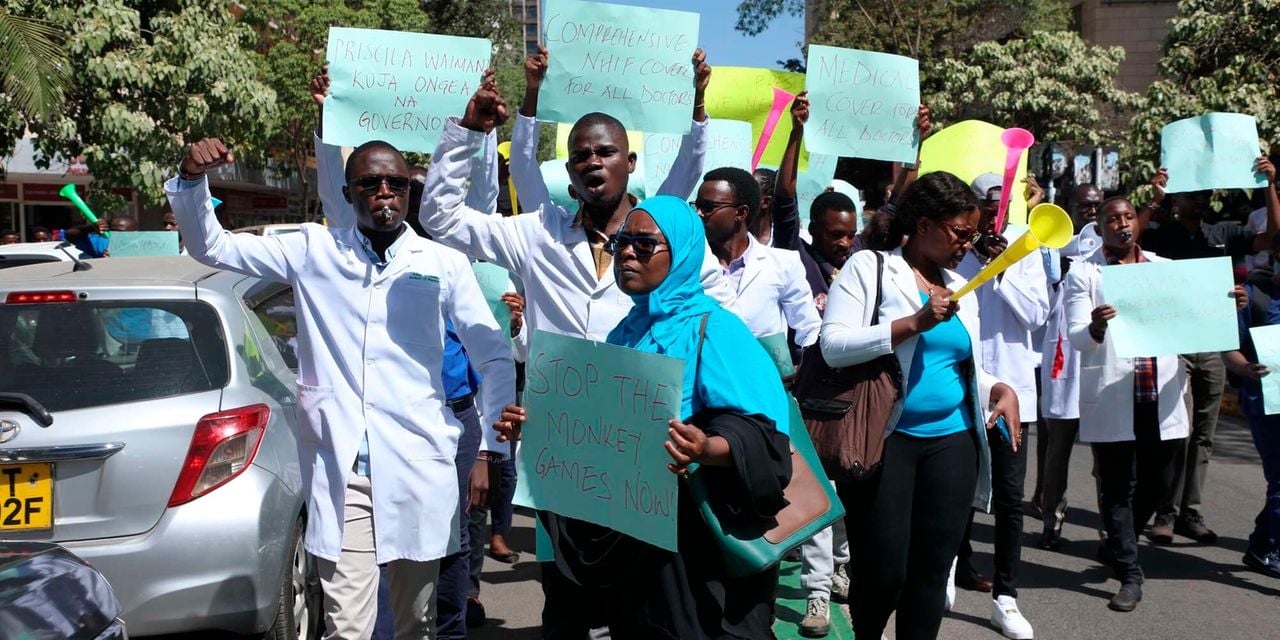
More than 4,000 jobless doctors could soon be banned from taking up employment abroad without special clearance from the government.
A leaked Ministry of Health memo shows plans to restrict unemployed medics from flying abroad for greener pastures, citing a shortage of health workers in the country.
The proposed workforce migration policy, according to the memo seen by the Sunday Nation, will regulate the sector to ensure the country’s health system is not “destabilized” by the flight of doctors.
“Kenya in the recent past has witnessed emigration and migration of the health workforce,” says the February 7 memo signed by Acting Health Director-General Patrick Amoth.
“Many countries continue to seek Kenyan health workers while, on another hand, the country cannot offer employment to all our health worker cadres who graduate from our training institutions.”
The memo was written two days after the Sunday Nation revealed, in an exclusive investigative story, the shame of thousands of Kenyan doctors who are on the verge of giving up after failing to secure employment for as many as five years after graduating from medical schools.
The story also exposed cases of medical jobless doctors who had killed themselves after slipping into depression.
“There is, therefore, a need to have systematic, coordinated, and harmonized health workforce migration process that will ensure the country’s mandate to provide health care is maintained,” says Dr Amoth in the memo addressed to heads of directorates, departments, and divisions in the ministry.
It discloses the existence of a task force that was formed to develop a “workforce migration policy as a national priority to guide the health sector on all matters of health workforce labour migration”.
The draft migration policy, which was due for validation at a meeting held on Thursday, could see the passing of regulations that will make it difficult for doctors to leave the country without the blessings of the Ministry of Health.
While the government insists that the migration policy is necessary to track where Kenyan healthcare workers end up after training, medical employees’ unions see sinister motives in the proposed regulations.
“They are not going to hold doctors accountable for leaving the country because they do not hold them accountable for being unemployed,” Kenya Medical Practitioners and Dentists Union Secretary-General Davji Attellah said.
“It is none of their business whether you are employed or not. You will not block them.”
He added that Kenya has much unemployed medical personnel yet there is an unimaginable shortage of the same at hospitals.
“This is a big joke,” Dr Attellah said.
Besides the worsening unemployment crisis, Dr Attellah cited lack of opportunities for postgraduate training, poor remuneration, bad working conditions, and civil unrest as significant reasons for leaving the country.
Even with the foreign employment restrictions in place, the Ministry of Health admits that the country cannot guarantee job opportunities to fresh medical graduates.
“If not well harnessed, migration has the potential of destabilizing or weakening our health system through various ways, including antecedent brain drain and long-term economic loss on education investments that end up not serving the country’s needs,” Dr Amoth says in the memo.
The ministry says the policy is also intended to guard against the possible exploitation of healthcare workers by predatory recruitment agencies, leading to uncoordinated and unfair labour engagements.
Governors, who under the devolved system of government, are the primary employers of doctors at public hospitals, yesterday supported the ministry and Dr Amoth, saying the decision would offer an avenue to monitor, protect and regulate the exit of the workers.
“Due to the country’s capacity, we are training more yet we cannot employ them,” Council of Governors, Health Committee Chairman and Tharaka-Nithi County boss Muthomi Njuki said.
“There is a huge gap in our hospitals. We are not against their leaving but the policy in place will regulate the sector.”
Mr Njuki added that with the new policy, it is easy for the government “to bargain for doctors” since they may be abused and exploited when they fly out.





















